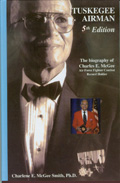
 |
From childhood some know what they are called to do, but not Charles McGee. Having lost his mother early, he alternated between time spent in the South with a family who were good disciplinarians and living in the North where his father was a preacher. Charles soon learned about racism; he also learned to obey and not complain. In the late 1930s, he worked on various CCC projects and developed an interest in civil engineering. That became his goal when he headed off to the University of Illinois. There he met his future wife, Frances Nelson.
Following Pearl Harbor, war and the draft were inevitable. In 1942 Charles heard that colored soldiers would be taught to fly; the Tuskegee Army airfield was preparing for trainees. Charles applied and was screened for what was called the "Tuskegee Experiment." Luckily, he escaped draft selection long enough for Tuskegee's acceptance. Charles (Chuck) McGee would pass flying school, train others, rack up the most fighter missions piloted in three wars (Europe, Korea, Vietnam), and be promoted to Colonel. Early subjected to discrimination on and off base, Charles was later given the key to one city that had not allowed him to rent an apartment.
Inspired by her father, the author earned her Ph.D. Proving herself an avid researcher, she attended Tuskegee Airmen gatherings to speak with her father's dearest friends or climbed onto the wing of a plane he once flew to capture his memories. McGee has kept awards updated. The few typos left do not detract from the life story of a hero. In 2007, President Bush presented the Medal of Honor to living Tuskegee graduates, including her father, for service in WWII. An epilogue documents his recognition by the National Aviation Hall of Fame in 2011. Photos and index enhance the book.
RECOMMENDED by the US Review